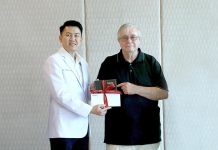What we eat is something that has fascinated us for centuries. These days, with our tentative forays into ‘real’ science, our dietary habits have also been scrutinized bringing out many claims for modifying the kinds of food we eat and what we drink. This in turn, has produced legions of people who swear by various food items which will cure everything from falling hair to falling arches (or even falling stock markets)!
Thailand has many of these wonder veggies and herbs. Thai authorities (such as the Thailand Institute of Scientific and Technological Research) claim that many herbs and spices used in everyday Thai cuisine have specific beneficial medicinal properties.
Chilli comes in many different species. Almost all Thai food has chillies somewhere and all contain capsaicin, a biologically active ingredient claimed to be beneficial to the respiratory system, blood pressure and heart. It is also supposedly an anti-flatulent. My experience has been more of the ‘ring of fire’ situation the next morning, but that is a personal observation, rather than a scientific conclusion.
Dried mature garlic bulbs are used as a flavoring and condiment and this is claimed to be an antimicrobial, expectorant and cholesterol lowering agent.
The next one I like, just for its name, and that is Hoary Basil, an annual herbaceous plant with slightly hairy and pale green leaves, eaten either raw or used as a flavoring. Its therapeutic benefits are that it is claimed to be a cough suppressant.
“Prik Thai” (pepper) is used as a spice and condiment, and every sidewalk cook has bottles of it as it is sprinkled heavily over everything. Pepper is supposed to bring your temperature down. It will, however, make you sneeze.
Of course, it is very difficult to ‘prove’ that by taking Outer Mongolian ground nut leaves or similar items, that ‘something’ (usually cancer) does not happen, though I do believe it keeps giraffes off the front lawn. Even more outrageous are the claims that some herb, poppy or whatnot can actually ‘cure’ cancers.
To be able to prove these claims needs medical science to look at a large group, or population, and compare the cancer experience with another similar large group or population. Ideally, the two groups are matched for age/sex/ethnicity/working environment, location, etc. You get no worthwhile results comparing Welsh coalminers with urban Africans, for example. Or even North-Eastern Thais with Southern Thais, for that matter.
Recently, some results of a 15+ year study in Australia were presented at the Prospects for Cancer Prevention Symposium. The findings emerged from the Cancer Council’s Melbourne Collaborative Cohort Study, an ongoing research project involving 42,000 Australians who have been monitored since 1990.
Looking at the dietary habits and the cancer connection, Dr Peter Clifton, director of the CSIRO’s Nutrition Clinic, said there was “zero evidence” that eating fruit and vegetables could protect against cancer. The nutritionists and the healthy eating proponents were shattered, leaving them feeling that perhaps now is the time to sell their shares in the Echinacea farm. However, Dr. Clifton’s zero evidence result is to me a much more compelling argument than something that comes from folklore, or the lady next door who swears by it. Or the old crone who makes noodle dishes at the corner of our street.
What the survey did show was that the three prime risk factors as far as predicting cancers were concerned were identified as obesity, drinking too much alcohol and smoking. Somehow they seem to have missed chilli, garlic and Hoary Basil.
More than that, staying within a healthy body weight range was found to be more important than following particular nutritional guidelines.
Professor Dallas English, of the Cancer Council of Victoria, told the symposium that despite decades of research, there was no convincing evidence on how modifying one’s diet would reduce the risk of cancer.
“The most important thing about diet is limiting energy (kilojoule) intake so people don’t become overweight or obese, because this has emerged as a risk factor for a number of cancers, including breast, prostate, bowel and endometrial (uterus),” he said.
So, despite chilli, garlic and Hoary Basil, kilojoules are more important! If cancer worries you, don’t join the obesity epidemic.




